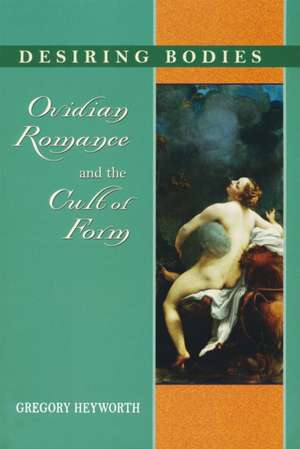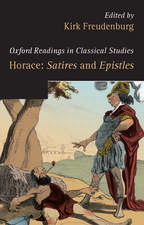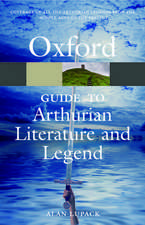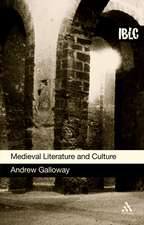Desiring Bodies – Ovidian Romance and the Cult of Form
Autor Gregory Heyworthen Limba Engleză Paperback – 29 iul 2009
Gregory Heyworth’s Desiring Bodiesconsiders the physical body and its relationship to poetic and corporate bodies in the Middle Ages and Renaissance. Beginning in the odd contest between body and form in the first sentence of Ovid’s protean Metamorphoses, Heyworth identifies these concepts as structuring principles of civic and poetic unity and pursues their consequences as refracted through a series of romances, some typical of the genre, some problematically so.
Bodies, in Ovidian romance, are the objects of human desire to possess, to recover, to form, or to violate. Part 1 examines this desire as both a literal and socio-political phenomenon through readings of Marie de France’s Lais, Chrétien de Troyes’ Cligès and Perceval, and Chaucer’s Canterbury Tales, texts variously expressing social, economic, and political culture in romance. In part 2, Heyworth is concerned with missing or absent bodies in Petrarch’s Rime sparse, Shakespeare’s Romeo and Juliet, and Milton’s Paradise Lost and the generic rupture they cause in lyric, tragedy, and epic. Throughout, Heyworth draws on social theorists such as Kant, Weber, Simmel, and Elias to explore the connection between social and literary form.
The first comparative, diachronic study of romance form in many years, Desiring Bodies is a persuasive and important cultural history that demonstrates Ovid’s pervasive influence not only on the poetics but on the politics of the medieval and early modern Western tradition.
"Desiring Bodiesanswers the question that might dog Comparative Literature as a discipline, i.e. 'so what?'. In a bravura display of cultural and linguistic range, Heyworth turns his own supple, Ovidian intelligence to Ovidian irruptions from within the civilizing project of romance. Heyworth writes with intense literary inwardness, adroitly turned learning, and pitch-perfect prose.” —James Simpson, Harvard University“Gregory Heyworth’s Desiring Bodies: Ovidian Romance and the Cult of Formis a wide-ranging, impressively learned, first-rate study with a provocative and weighty central argument.” —Monika Otter, Dartmouth College
“Gregory Heyworth's Desiring Bodiesis a highly original study. It is also very daring—breathtakingly so, at times—in its deep engagement with major canonical writers and texts of the Middle Ages and the Renaissance, from twelfth-century Latin comedy to Milton's Paradise Lost. His remarkable essay is achieved within a stimulating cultural and artistic exegesis of a single Ovidian line in which Heyworth finds his own large subject—the famous first line of the Metamorphoses, in which the poet announces the intention to tell ‘of forms changed into new bodies.’” —John Fleming, Princeton University
"Ambitious in its aims, convincing in its arguments, and frequently surprising in its readings, Desiring Bodiesasks us to reconsider how literary works both respond to and adapt the remains of the literary past. By establishing Ovid as the defining figure of formal metamorphoses across literary history, Heyworth opens new possibilities for imagining literary history as a history of literary form." —Jennifer Summit, Stanford University
Preț: 302.54 lei
Nou
Puncte Express: 454
Preț estimativ în valută:
57.90€ • 60.22$ • 47.80£
57.90€ • 60.22$ • 47.80£
Carte tipărită la comandă
Livrare economică 15-29 aprilie
Preluare comenzi: 021 569.72.76
Specificații
ISBN-13: 9780268031060
ISBN-10: 0268031061
Pagini: 376
Dimensiuni: 156 x 233 x 27 mm
Greutate: 0.52 kg
Ediția:1st Edition
Editura: MR – University of Notre Dame Press
ISBN-10: 0268031061
Pagini: 376
Dimensiuni: 156 x 233 x 27 mm
Greutate: 0.52 kg
Ediția:1st Edition
Editura: MR – University of Notre Dame Press
Recenzii
“Heyworth has written a sophisticated study of the importance of Ovidian form in the poetics and politics of medieval and Renaissance romance . . . the author demonstrates one of Ovid’s central attributes: he was an expert historian of culture and the ways in which individuals desired culture to exist. . . . All six chapters are well written, but chapter 3 is a revelation; in it, Heyworth magisterially examines Ovidian notions of the politics of marriage in the Canterbury Tales, particularly “The Knight’s Tale.” —Choice
"In nova fert animus mutates dicere formas corpora" ("My mind is bent to tell of forms changed into new bodies"). This famous first line of Ovid's Metamorphoses provides the central motif for Heyworth (English, U. of Mississippi) as he traces tensions between form and body in the cultural history of Medieval and Renaissance Europe. He explores those aspects of European culture that prioritize the body and the individual over form and group both in terms of social and political thought and in terms of genre and literature.” —Reference & Research Book News
“There is much to savor in this excellent volume. With laudable elegance and lexical sophistication, Gregory Heyworth’s unique, comparative study soars with ease across the landscape of cultural history in order to bring forth the ‘monolithic’ Ovidian influence on romance form in a selection of noteworthy medieval and Renaissance authors. With exceptional agility, Heyworth’s volume captures the powerful resonance of the Latin Poet’s voice through the ages. . .” —Parergon
Notă biografică
Gregory Heyworth is associate professor of English at the University of Mississippi.



















